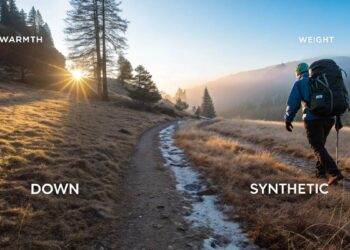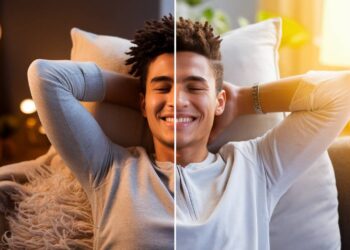Ever wondered why some days you’re bouncing with energy while others feel like you’re wading through molasses? The secret might be hiding in your sleep patterns. Welcome to the fascinating world of sleep tracking “where data meets dreamland and science meets shut-eye”.
Whether you’re a parent trying to decode your toddler’s sleep regression, a professional seeking peak performance, or a caregiver supporting seniors’ well-being, understanding your sleep patterns is like having a roadmap to better health. Get ready to unlock the mysteries behind those precious hours of rest and discover how tracking sleep could revolutionize your well-being.
“Sleep is the best meditation for understanding your body’s needs.” – Dr. William Dement
Importance of Tracking Sleep
Getting clued up on how you snooze can really boost your overall vibe—no matter your age. From toddlers to teens, tracking sleep is the secret ingredient to solving the family puzzle of making sure everyone’s well-rested.
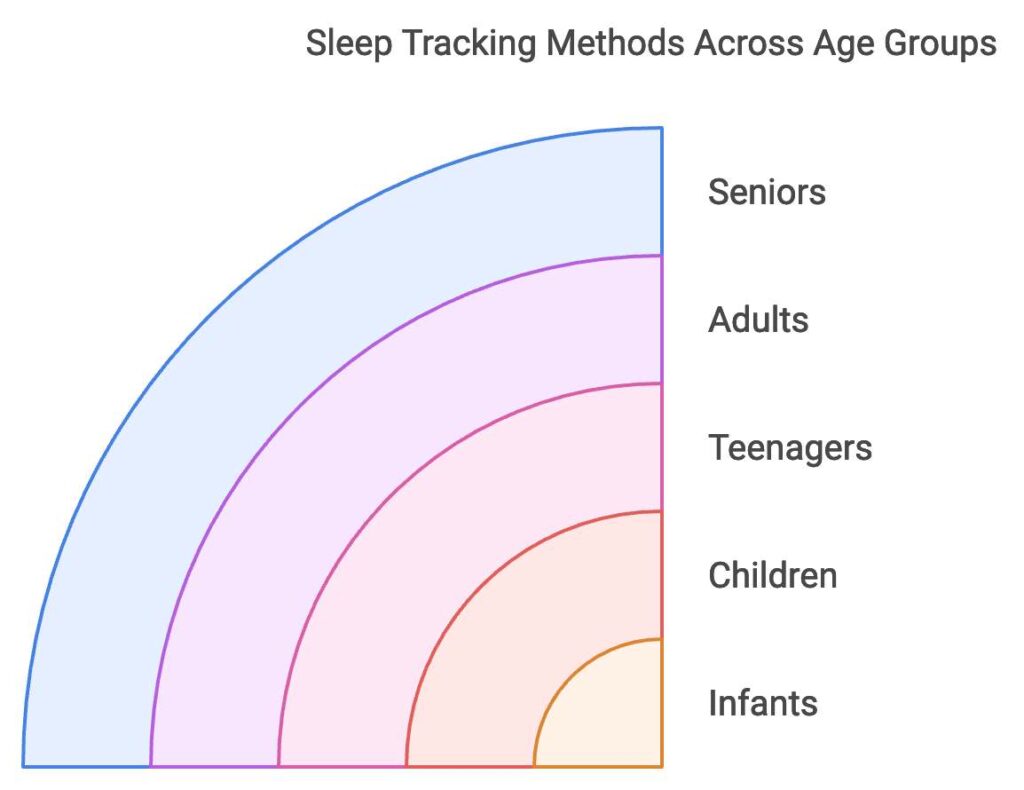
Benefits of Monitoring Sleep
Keeping tabs on your Zzz’s means fewer yawns and more high-fives for good health. Let’s break it down:
| Benefit | What It Means for You |
|---|---|
| Better Sleep | Find out what’s messing with your sleep and tweak things for a cozier snooze. |
| Happy Moods | Sleep well, feel swell. A solid night’s kip perks up your mood and keeps those mood swings in check. |
| More Energy | Decode your sleep and boss your daily schedule for super productivity. |
| Health Check | Track sleep to catch any health hiccups early, like those nasty sleep disorders. |
Why Track Children’s Sleep
Children are little busy bees evolving, buzzing around with ever-changing sleep habits. Pinning down their sleep is key to nurturing their growth spurt growth and keeping tantrums at bay.
| Age Group | How Much Shuteye They Need |
|---|---|
| Newborns | 14-17 hours |
| Toddlers | 11-14 hours |
| Preschoolers | 10-13 hours |
| School-age Kids | 9-12 hours |
| Teenagers | 8-10 hours |
- Support Development: Good sleep grows good brains. Keeping an eye on it ensures they get the necessary downtime for healthy body and mind growth.
- Tackle Sleep Woes: Many kids run into sleep snags—take toddler sleep regression, for example. Tracking their sleep helps nip these in the bud.
- Daily Rhythm: Decode their natural sleep groove to sync daily life with it, resulting in fewer morning grumps and more sunshine.
- Build Good Habits: Discover how stuff like screen time affects sleep, making it simpler to mold healthy sleep environments.
Throwing a few pennies into sleep tracking can set your kiddos up for a healthier, happier future, as learning how to sleep well is a life-hack worth its weight in gold.
Child Sleep Trackers
Overview of Child Sleep Trackers
Child sleep trackers are nifty gadgets designed to keep tabs on a kid’s snooze and z’s. They give parents a peek into how their little ones are catching those crucial winks. And let’s face it, knowing how much and how well they’re sleeping can be a lifesaver for their health (and your sanity). Getting the lowdown on their sleep cycles might just be the ticket to sorting out night-time chaos like toddler sleep regression or helping preschoolers hit the hay smoothly.
These trackers paint a pretty clear picture of junior’s nightly adventures. They’re loaded with sensors to track movements, pick up noises, and sometimes even keep an eye on the ol’ ticker (heart rate!). This treasure trove of info helps you tweak bedtime rituals and create a cozy sleep oasis for your tiniest dreamer.
Features to Look for in a Child Sleep Tracker
Picking out the perfect sleep tracker for your kiddo? Here’s the lowdown on features you’ll want to consider for top-notch performance and ease of use:
| Feature | Description |
|---|---|
| Sleep Phase Tracking | Peeks into different sleep stages like light, deep, and REM. Gives you a better handle on your child’s sleep drumbeat. |
| Movement Alerts | Sends a heads-up if your bundle of joy is tossing and turning too much, hinting at sleep probs. |
| Sound Monitoring | Keeps an ear out for noises during sleep, helping you figure out if they’re waking up or just sleep-talking. |
| Temperature and Humidity Sensors | Spills the beans on room conditions, making sure it’s all cozy and snug for the night. |
| User-Friendly App | Hooks up to a phone app so you can easily check sleep logs, set alarms, and tweak settings. |
| Battery Life | A champ battery is a must for keeping the sleep watch going all night long. |
| Wearable vs. Non-Wearable | Trackers can be worn like a bracelet or placed in the room. Choose what fits best for your little one’s bedtime routine. |
You might also want to think about passing sleep data on to your doctor’s office if there’s a mysterious sleep snag lurking. Curious about sleep in different kiddo stages? Swing by our articles on newborn sleep patterns, toddler sleep regression, and preschooler sleep habits.
Teenagers and Young Adults
Sleep Tracking for Teenagers
Sleep tracking is catching on with teenagers, and for good reason. It’s a handy tool that helps tackle the sleep puzzles teens face every day. With jam-packed schedules of school, sports, and hanging out with friends, it’s easy to see why catching those Z’s is often easier said than done. Teens are told they need about 8 to 10 hours of sleep each night, but we all know that’s not happening for most.
| Age Group | Recommended Sleep (Hours) |
|---|---|
| Teenagers (14-17 years) | 8-10 |
| Young Adults (18-25 years) | 7-9 |
With sleep trackers made for older kids, parents and teens can keep tabs on how much sleep they’re actually getting and how restful it is. This info can shine a light on what’s causing those restless nights, like staying up late scrolling through Instagram. Once they spot a pattern, they can step up their game and start snoozing better.
Impact of Sleep on Young Adults
Sleep—or lack of it—does a number on young adults, and it’s not just about feeling groggy. Thanks to all-nighters and party life, college kids especially are prime candidates for teenage sleep deprivation. Not getting enough shuteye can make your brain feel like it’s on a permanent fog. It can also mess with your mood and leave you lagging behind socially and academically.
A study spilled the beans on how bad sleep is hitting college students:
| Effects of Sleep Deprivation | Percentage of Young Adults Affected |
|---|---|
| Can’t focus worth a dime | 65% |
| Anxiety levels skyrocket | 60% |
| Dragging through the day | 70% |
Getting enough sleep’s a game-changer—it can brush away stress and keep your mind clear and sharp. If you’re trying to pull yourself together in college, finding a sleep routine that works is key. For tips that won’t steer you wrong, swing by our take on college student sleep tips.
Tracking sleep habits can really open young folks’ eyes to how their sleep habits affect their everyday life. Knowing what’s going on at night can make a big difference in their overall health and how well they do in their daily hustle.
Middle-Aged Adults
By the time folks hit that middle-age stride, sleep can start feeling a bit like a rollercoaster. Recognizing what throws a wrench in these slumber plans and finding ways to fix it can work wonders for getting some quality shut-eye.
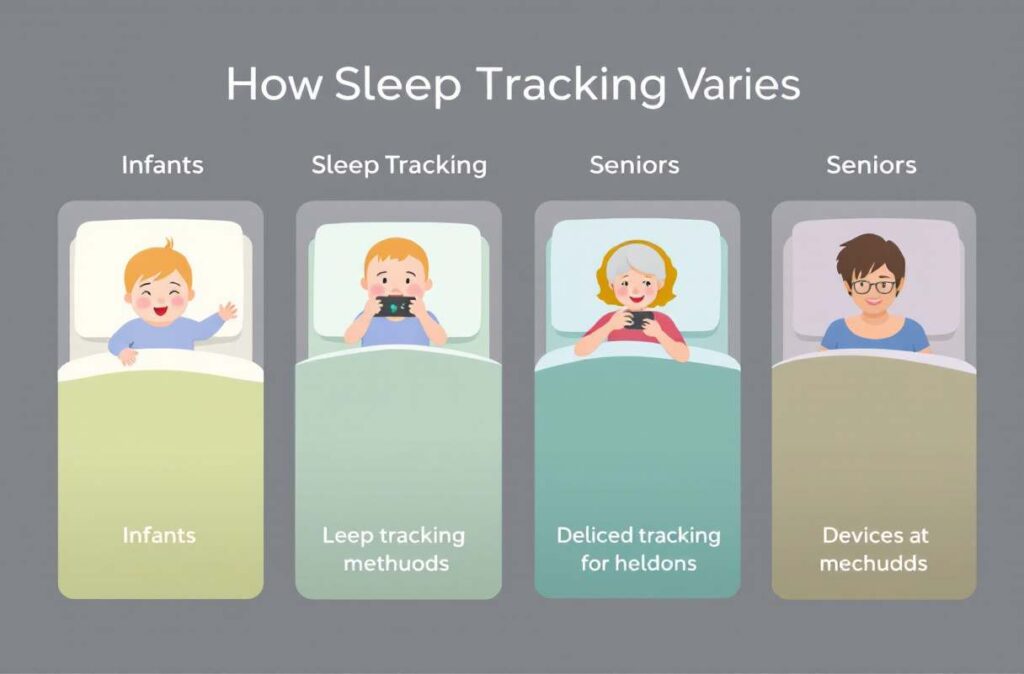
Challenges of Sleep Tracking for Middle-Aged Adults
Middle-aged peeps trying to keep tabs on their sleep might hit a few bumps. Here’s what they might face:
Hormonal Rollercoaster: Ah, the joys of hormones! For women, perimenopause or menopause can introduce all sorts of nighttime disruptions like insomnia or pesky night sweats. It’s like your body suddenly decided to throw a party at 2 a.m. that no one asked for.
Stress Overload: Balancing work, home life, and aging is like juggling flaming torches. Stress messes with how deep and how long you sleep, often leaving you feeling a bit like the Walking Dead by morning.
Health Hiccups: Middle age can roll out a welcome mat for things like sleep apnea and chronic pain. These health nuggets can slice your sleep into bits and pieces, making it tough to get that restorative snooze.
Busy Bee Syndrome: Packed days lead to haphazard sleep patterns. Crazy bedtime schedules and the lure of endless screen time don’t exactly make you the MVP of sleep tracking.
| Challenge | Impact on Sleep |
|---|---|
| Hormonal Fluctuations | Insomnia, Night Sweats |
| Stress | Sleep Interruption, Reduced Quality |
| Health Issues | Fragmented Sleep, Lower Quality |
| Lifestyle Frenzy | Irregular Sleep Patterns, Chaotic Habits |
Solutions and Strategies
Facing these sleep challenges head-on is a solid move for folks. Here’s what might help:
- Grab a Sleep Tracker: Think of it like a fitness tracker, but for your Zs. These little gadgets offer a peek into sleep patterns and how well you’re actually sleeping. Over time, you can spot what’s improving.
- Boost Sleep Hygiene: Keeping sleep times consistent can reset your body clock back to a sane schedule. Chill out before hitting the hay and cut back on screen time to keep your nights screen-free.
- Stress Busters: Meditation, yoga, or just some simple breathing exercises can help mellow out those stress levels, paving the way for better snoozing.
- Talk to the Doc: If sleep apnea or other health gremlins are messing with your sleep, it’s time to see the pros. They might have some tricks up their sleeves to up your sleep game.
- Craft a Sleep Sanctuary: Make sure your sleep spot feels like one. A good mattress and a dark, peaceful space can really crank up the quality of your rest. For mattress tips, we’ve got the lowdown just a click away.
Tackling the sleep hurdles of middle age doesn’t have to feel like climbing Everest. With the right tools and tricks, getting back to those blissful nights is within reach. Sleep well!
Seniors and Caregivers
Importance of Sleep Monitoring for Seniors
Sleep is like that secret ingredient for health, especially important as folks get older. As the years roll on, how we catch those Z’s can shift a lot. So, for seniors, keeping tabs on how much and how well they’re sleeping is a big deal. Why? Because spotting problems like tossing and turning all night, or more serious issues like sleep apnea, can make a huge difference in how they feel day-to-day.
One super important reason for checking out sleep for older adults is brain health. Studies point out that good sleep vibes are tied to sharp thinking and quick wit, even when the hair starts to silver. By being sleep detectives, caregivers help seniors keep their brainpower buzzing and their spirits lifted.
| Age Group | Snooze Hours Needed | Typical Sleep Hiccups |
|---|---|---|
| 60-69 | 7-9 hours | Breathing snags at night, can’t fall asleep |
| 70+ | 7-8 hours | Ants in the pants syndrome, waking up way too often |
How Caregivers Can Benefit from Sleep Data
Caregivers—think of them as the real-life superheroes—make sure that seniors get the TLC they need. Digging through sleep data gives them the scoop to be even better at their jobs.
This handy info can uncover who’s tossing and turning at night. Kids in the 70+ club waking up for midnight snack runs more frequently? If a caregiver spots this, it’s time to play detective with the sleep setup: are the lights too blinding, is the room too noisy, or too hot?
Plus, sleep charts can help caregivers figure out any connections between night owls and their daytime routines. Let’s say a senior’s got their eyes glued to gadgets before bed—that might be what’s messing with their beauty sleep. Giving a nudge to leave screens off before bedtime, like we talk about in our piece on screen time and sleep, could do wonders.
Being the trusty sidekick to doctors, caregivers can share this sleep scoop, working together to come up with game plans for sleep hang-ups like senior sleep apnea.
With the help of sleep tracking, caregivers aren’t just improving bedtime; they’re boosting the overall well-being of the seniors they care for. Tossing sleep monitoring into the mix is not just smart—it’s awesome caregiving.
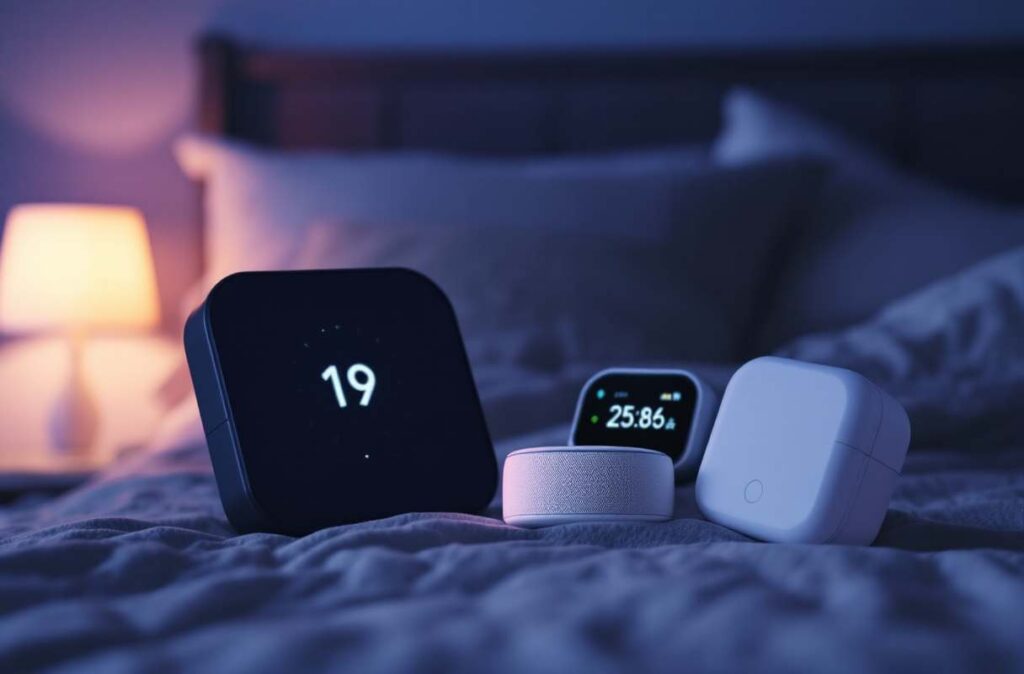
Healthcare Professionals’ Perspective
Role of Sleep Trackers in Healthcare
Sleep trackers are turning into must-have gadgets in the healthcare scene. They’re spilling the beans on how people snooze, providing that juicy data that helps doctors get the full picture of one’s health. These nifty devices let healthcare folks pinpoint issues and suggest custom fixes.
“Sleep tracking is revolutionizing how we understand and treat sleep disorders.”
Take, for example, a healthcare provider can comb through sleep tracker details to catch sleep disorders like insomnia or sleep apnea. It’s like having a radar that spots troubles and helps tailor treatment plans, especially for kiddos struggling with sleep shenanigans. Check out some perks they bring to the table:
| Health Benefit | Description |
|---|---|
| Early Detection | Spots sleep disorders before they escalate. |
| Customized Interventions | Crafts unique treatment plans with sleep data. |
| Enhanced Communication | Makes chats between patients and docs smoother. |
Docs also peek at stuff that messes with sleep, like how much you’re glued to your screen, what you chow down on, and other lifestyle quirks. This all-round approach makes sure nothing slips through the cracks when it comes to health.
Integrating Sleep Data into Patient Care
Bringing sleep insights into patient care jazzes up the whole health watch game. Doctors can use data to chat with patients and their families, setting the stage for open and supportive conversation.
Say a patient’s dealing with a sleep mess, doctors can dive into sleep tracker deets along with other life bits—like workouts and mental vibe. It’s like putting together a puzzle for smarter decisions. Here’s how they roll out the red carpet for sleep data:
| Integration Method | Description |
|---|---|
| Patient Portals | Lets folks swap sleep stats alongside other health info. |
| Regular Consultations | Keeps sleep chit-chat ongoing. |
| Collaborative Care | Team up docs to tackle sleep problems with other health gripes. |
And let’s not forget the caregivers of our golden-aged folks who might battle with things like sleep apnea. Understanding sleep bits helps them suggest sleep tips to parents dealing with infant night woes or toddler bedtime chaos.
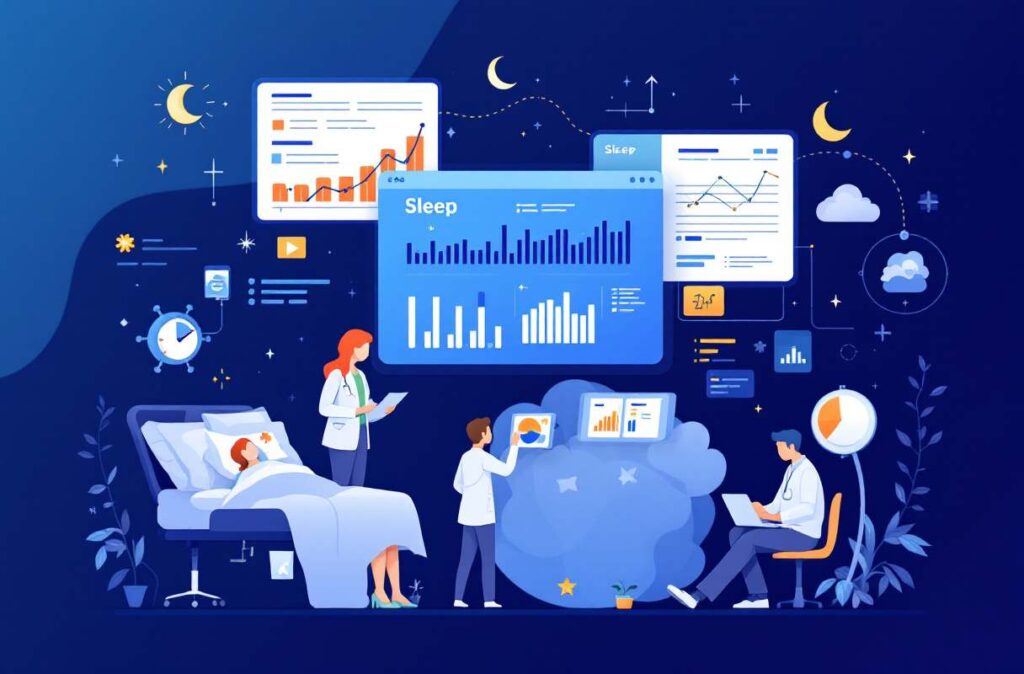
By smartly blending sleep data into patient care, health pros step up game—they’re shooting for better results, boosting sleep health for everyone, and nudging everyone towards a healthier lifestyle.
Conclusion
Sleep tracking isn’t just about collecting numbers – it’s about transforming your understanding of rest and rejuvenation. From the developmental needs of growing children to the unique challenges faced by seniors, tracking sleep provides invaluable insights for every age group. By embracing sleep monitoring tools and techniques, we can all take control of our sleep health, leading to more energized days and peaceful nights. Remember, quality sleep isn’t a luxury – it’s a cornerstone of health that deserves our attention and understanding. So start tracking, start understanding, and start sleeping better tonight.
FAQs
Why is sleep tracking important for different age groups?
Sleep tracking needs vary by age – from monitoring developmental milestones in children to managing health conditions in seniors. It helps identify patterns and potential issues specific to each life stage.
What are the most reliable methods for tracking sleep?
Professional sleep studies provide the most accurate data, but wearable devices, smart mattresses, and sleep apps offer valuable insights for daily tracking. Manual sleep journals can also be effective.
How long should I track sleep to see meaningful patterns?
Track sleep for at least 2-4 weeks to establish baseline patterns. This allows time to identify trends and correlations between daily habits and sleep quality.
Can sleep tracking help identify sleep disorders?
Yes, consistent tracking can reveal potential sleep disorders by highlighting irregular patterns, frequent wakings, or unusual sleep durations that warrant professional attention.
What sleep metrics should I focus on?
Key metrics include total sleep time, sleep efficiency, wake times, and sleep quality. For children, also track nap patterns and bedtime consistency.
Resources
- Sleep Foundation: “Sleep Tracking”
https://www.sleepfoundation.org/sleep-topics/sleep-tracking - American Academy of Sleep Medicine: “Sleep Education”
https://sleepeducation.org/tracking-tools/ - Cleveland Clinic: “hat Happens When You Don’t Get Enough Sleep”
https://health.clevelandclinic.org/sleep-monitoring/




